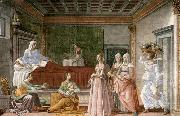Wholesale Oil Painting Reproductions No Minimum and Door to Door! |
|||||||||||
|
|
|||||||||||

|
|||||||||||
|
|
|
||||||||
All Domenico Ghirlandaio Oil Paintings |
||||||||
|
|
||||||||
|
|
||||||||
|
Artist Introduction: Italian
1449-1494
Domenico Ghirlandaio Galleries
Painter, mosaicist and possibly goldsmith. He was head of one of the most active workshops in late 15th-century Florence. He developed a style of religious narrative that blended the contemporary with the historical in a way that updated the basic tenets of early Renaissance art. Domenico documented material situation |
||||||||
|
|
||||||||
|
Birth of St John the Baptist Painting ID:: 62404 |
1486-90 Fresco Cappella Tornabuoni, Santa Maria Novella, Florence The Birth of St John the Baptist and the Zacharias Writes Down the Name of his Son can be found on the second level of the right wall. The scene is described by Vasari. "... the birth of St John, with a beautiful idea that, while Elisabeth is in bed and being visited by her neighbours and a nurse is suckling the child, a woman is eagerly calling the attention of the visitors to the wonder that has come to her mistress in her old age; and lastly there is a woman bringing fruit and wine from the city, in conformity with the Florentine custom. This is very fine". In the Birth of Saint John the Baptist Ghirlandaio once again created a room flooded with light and air. We can well imagine that the palace rooms of Ghirlandaio's patrons being similar to this. In this picture he makes use of contrasting complementary colours by placing the red bedspread in front of the green wall hanging. In front of the wall hanging, a maid dressed in red and green is carrying a tray with carafes of water and wine for the refreshment of the woman in childbed. The golden orange hues of the pilasters and entablatures form a complementary contrast with the light blue of aged Elizabeth and the young maid coming in from at the far right. Such colour schemes help to create the captivating clarity that characterizes so much of Ghirlandaio's work. It is not just the age of Elizabeth and her maid that contrast, but also their respective auras of stillness and movement. Nowadays it is astonishing to think that Savonarola, the severe preacher of repentance, could have taken exception to this superb maid. She corresponds to the nurse on the far left, who is stretching out her arms eagerly. The two figures form an exciting frame for the quiet scene taking place in-between. In the Birth of John the Baptist, Elizabeth is visited by female representatives of the donor family - as is Anne in the birth scene on the opposite wall. The only figure that can be identified is that of the poet Lucrezia Tornabuoni, who was known for being very virtuous. She was the mother of Lorenzo de' Medici and a friend of the humanist Agnolo Poliziano and Luigi Pulci, portrayed in the Sassetti Chapel together with her son. There is actually nothing in this scene to suggest that it is depicting an event from the story of St John - with the sole exception of the severely weather-beaten halo surrounding Elizabeth's head. In this scene from everyday life, Ghirlandaio surpassed even his beautiful Birth of Mary. In addition to the marvelous basket of fruit, he added another two still-lifes to the picture in order to make it appear more home-like and realistic. On the far left two objects, a brass jug and bowl, that we are already familiar with from the fresco the Last Supper in the church of Ognissanti, and from the frescoes in the Santa Fina Chapel. At the top of the bed's headboard, next to the window, there is a symmetrical arrangement of a box, two pomegranates and a vase, reminiscent of both Saint Jerome's study and the frescoes in the Saint Fina Chapel. All these things once again bring Flemish painting to mind, which during this period made widespread use of everyday secular details as accessories. The miniature depicting the birth of Saint John the Baptist in the Turin/Milan Book of Hours is an outstanding example - a superb work that was most probably painted by Jan van Eyck himself, though its attribution is just as disputed as its date. Author: GHIRLANDAIO, Domenico Title: Birth of St John the Baptist , 1451-1500 , Italian Form: painting , religious |
|||||||
Height Width |
INS/CM Quality |
|||||||
|
X |
| |||||||
|
|
||||||||
|
Prev Next
|
||||||||
|
|
||||||||
|
Related Paintings to GHIRLANDAIO, Domenico :. |
||||||||
|
|
||||||||
|
CONTACT US |

